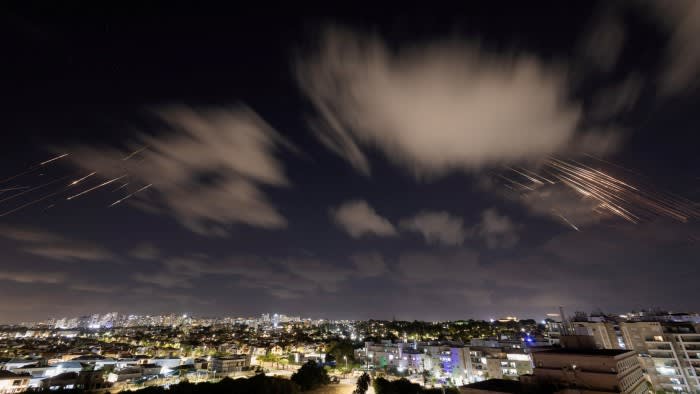Israeli Prime Minister Benjamin Netanyahu vowed to retaliate against Iran after the Islamic republic fired scores of ballistic missiles at Israel on Tuesday as the region slid ever closer towards all-out war.
Speaking after the Israeli military said Tehran had fired about 180 missiles at the country, Netanyahu warned “Iran made a big mistake tonight — and it will pay for it”.
“Whoever attacks us, we will attack them,” he said.
Israeli military spokesperson Daniel Hagari said most of the Iranian missiles had been intercepted, but added there were “a few hits in the centre and other areas in the south of the country”. He said the military was not aware of any casualties.
A person briefed on the situation said the Iranian barrage had targeted military and intelligence infrastructure near Tel Aviv and other facilities elsewhere in the country.
Abbas Araghchi, Iran’s foreign minister, said in a social media post early on Wednesday morning that Iran’s “action is concluded unless Israeli regime decides to invite further retaliation. In that scenario, our response will be stronger and more powerful.”
The attack came with little warning and marked a dramatic escalation in hostilities between Iran and Israel, which has been intensifying its offensive in Lebanon against Hizbollah, Tehran’s most important proxy.
Hours before the Iranian missile attack, Israel said it had launched a ground offensive against Hizbollah in southern Lebanon — four days after it assassinated the militant group’s leader Hassan Nasrallah.
The surge in conflict puts the Middle East on the brink of an all-out war that could drag in the US, which has pledged to defend Israel.
US national security adviser Jake Sullivan described the Iranian attack as “a significant escalation”.
“We are now going to look at what the appropriate next steps are” to secure American interests and promote stability in the region, he said.
Iran’s Revolutionary Guards said they had launched tens of ballistic missiles at Israel in retaliation for the assassinations last week of Nasrallah and a senior Guards commander in a wave of Israeli air strikes that flattened at least six residential buildings in Beirut.
The Guards said the barrage was also in response to a suspected Israeli attack that killed Hamas’s political leader Ismail Haniyeh in Tehran in July.
“The Aerospace Forces of the Guards have targeted the heart of the occupied territories,” they added. “This comes after a period of restraint . . . following the escalation of the Zionist regime’s aggressive actions.”
The Guards warned that any Israeli response would result in “devastating” attacks on the Jewish state, adding that 90 per cent of its missiles had hit their targets.

Iranian state media released videos that it claimed showed missiles had successfully hit their targets, including “the heart of Tel Aviv”, an air base and a civilian airport.
US President Joe Biden convened an emergency meeting with vice-president Kamala Harris and their national security team to discuss Iran’s attack.
Pat Ryder, the Pentagon spokesperson, told reporters that US Navy destroyers deployed in the Middle East had fired about a dozen interceptors against incoming Iranian missiles.
The US has been deploying additional forces since Israel assassinated Nasrallah and intensified its bombing campaign on Lebanon. It has about 40,000 troops in the region.

After warnings of the Iranian attack were issued hours before the missile barrage was launched, Brent crude, the international benchmark oil price, rose as much as 5 per cent to $75.40 a barrel after previously trading down on the day. Gold prices also rose.
When Iran last directly launched a missile barrage against Israel in April, the attack was clearly telegraphed and caused limited damage.
Then, Israel retaliated with a calibrated missile attack on a base near the Iranian city of Isfahan, with both sides signalling they did not want a further escalation.
But Iran’s latest barrage of missiles came with far less warning.
Netanyahu has stepped up his rhetoric against Tehran in recent weeks, while also significantly escalating Israel’s conflict with Hizbollah.
Over the past fortnight, Israel has launched waves of devastating strikes across Lebanon, killing Nasrallah, other Hizbollah commanders and triggering panic across the fragile nation.

The Israeli bombing campaign has killed more than 1,000 people in Lebanon and forced up to 1mn people from their homes, according to Lebanese authorities.
Israel characterised its land offensive into southern Lebanon as “limited, localised, and targeted ground raids” against Hizbollah.
It said it was seeking to make northern Israel safe to return for about 60,000 people displaced by Hizbollah’s rocket fire.
The Lebanese group began firing on Israel a day after Hamas, the Palestinian militant group, launched its October 7 attack on the Jewish state.
The regional escalation has been accompanied by a ratcheting up of Israel’s rhetoric, with officials talking about “defeating” Hizbollah and Netanyahu pledging last week to “change the balance of power in the region for years”.
Iranian leaders have repeatedly said they do not want to be drawn into a broader Middle East war, adding that the Islamic republic would not fall into what they have described as Israel’s “trap”.
But after appearing weak at home and in the region with Hizbollah, its key proxy, taking devastating blows, the Tehran regime decided to risk a direct attack.
Additional reporting by Raya Jalabi in Beirut, Mehul Srivastava in Tel Aviv and Rafe Uddin in London
